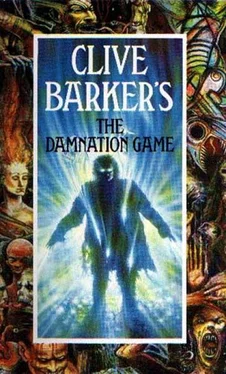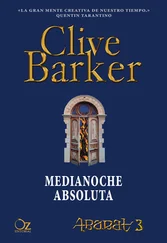Clive Barker - The Damnation Game
Здесь есть возможность читать онлайн «Clive Barker - The Damnation Game» весь текст электронной книги совершенно бесплатно (целиком полную версию без сокращений). В некоторых случаях можно слушать аудио, скачать через торрент в формате fb2 и присутствует краткое содержание. Жанр: Ужасы и Мистика, на английском языке. Описание произведения, (предисловие) а так же отзывы посетителей доступны на портале библиотеки ЛибКат.
- Название:The Damnation Game
- Автор:
- Жанр:
- Год:неизвестен
- ISBN:нет данных
- Рейтинг книги:4 / 5. Голосов: 2
-
Избранное:Добавить в избранное
- Отзывы:
-
Ваша оценка:
- 80
- 1
- 2
- 3
- 4
- 5
The Damnation Game: краткое содержание, описание и аннотация
Предлагаем к чтению аннотацию, описание, краткое содержание или предисловие (зависит от того, что написал сам автор книги «The Damnation Game»). Если вы не нашли необходимую информацию о книге — напишите в комментариях, мы постараемся отыскать её.
The Damnation Game — читать онлайн бесплатно полную книгу (весь текст) целиком
Ниже представлен текст книги, разбитый по страницам. Система сохранения места последней прочитанной страницы, позволяет с удобством читать онлайн бесплатно книгу «The Damnation Game», без необходимости каждый раз заново искать на чём Вы остановились. Поставьте закладку, и сможете в любой момент перейти на страницу, на которой закончили чтение.
Интервал:
Закладка:
Somebody was now reading the lesson. An actor, to judge by the self-regarding tone. It was announced as a passage from the Psalms, but Marty didn't recognize it.
As the reading was drawing to a close, a car drew up at the main gate. Heads turned and cameras clicked as two figures emerged. A buzz spread through the crowd; people who'd taken to lying down stood up again to see what could be seen. Something roused Marty from his lethargy, and he too stood on tiptoe to glimpse the latecomers: it was quite an entrance they were making. He peered between the heads of the crowd to catch a look; caught sight, then lost it again; said "no," quietly to himself, not believing; then pushed his way through the crowd trying to keep pace as Mamoulian, a veiled Carys at his side, glided down the pathway from gate to porch and disappeared into the church. "Who was it?" somebody asked him. "Do you know who it was?"
Hell, he wanted to answer. The Devil himself.
Mamoulian was here! In broad daylight, sun on the back of his neck, walking with Carys arm in arm like man and wife, letting the cameras catch him for tomorrow's edition. He had no fear, apparently. This late appearance, so measured, so ironic, was a final gesture of contempt. And why did she play his game? Why didn't she throw off his hand and denounce him for the unnatural thing he was? Because she'd gone willingly into his entourage, the very way Whitehead had told him she would. In search of what? Someone to celebrate that strain of nihilism in her; to educate her in the fine art of dying? And what might she give in return? Ah, there was the prickly question.
At long last the service came to an end. Suddenly, to the delight and outrage of the congregation, a raucous saxophone broke the solemnity, and a jazz rendering of "Fools Rush In" was blaring over the loudspeakers. Whitehead's final joke, presumably. It earned its laughs; some of the crowd even applauded. From inside the church there came the clatter of people rising from their pews. Marty craned to get a better view of the porch, and failing, threaded his way back through the press of people to a tomb that offered a view. There were birds in the heat-drooped trees, and their pursuits distracted him, catching him up in their swooping play. When he looked back the coffin was almost parallel with him, shouldered, among others, by Ottaway and Curtsinger. The plain box seemed almost indecently exposed. He wondered what they'd dressed the old man in at the last; if they'd trimmed his beard and sewed his eyelids shut.
The procession of mourners followed on the heels of the pallbearers, a black cortege that parted the candy-colored sea of tourists. To right and left the shutters tutted; some damn fool called, "Watch the birdy." The jazz played on. It was all gratifyingly absurd. The old man, Marty guessed, would be smiling in his box.
Finally Carys and Mamoulian emerged from the shade of the porch into the brilliance of the afternoon, and Marty was sure he caught the girl cautiously scanning the crowd, fearful that her companion would notice. She was looking for him; he was certain of it. She knew he'd be there, somewhere, and she was looking for him. His mind raced, tripping over itself in its turmoil. If he made a sign to her, however subtle, there was every chance Mamoulian would see it, and that was surely dangerous for them both. Better to hide his head then, painful as it was not to lock glances with her.
Reluctantly, he stepped down off the tomb as the clump of mourners came abreast of him, and spied what he could from the shelter of the crowd. The European scarcely raised his head from its bowed position, and from what Marty could glimpse between the bobbing heads Carys had given up her search-perhaps despairing of his being there. As the coffin and its black tail wound out of the churchyard, Marty ducked away and over the wall to watch events precede from a better vantage point.
In the road Mamoulian was speaking to one or two of the mourners. Handshakes were exchanged; commiserations offered to Carys. Marty watched impatiently. Perhaps she and the European would separate in the throng, and he'd get a chance to show himself, if only momentarily, and reassure her of his presence. But no such opportunity presented itself. Mamoulian was the perfect guardian, keeping Carys close to him every moment. Pleasantries and farewells exchanged, they got into the back of a dark green Rover and drove away. Marty raced to the Citroën. He mustn't lose her now, whatever happened: this was perhaps his last chance to locate her. The pursuit proved difficult. Once off the small country roads and onto the highway the Rover accelerated with insolent ease. Marty gave chase as discreetly as the twin imperatives of tactics and excitement would allow.
In the back seat of the car Carys had a strange, flickering thought. Whenever she closed her lids to blink or shut out the day's glare, a figure appeared: a runner. She recognized him in seconds: the gray track suit, a cloud of steam emerging from the hood, named him before she glimpsed his face. She wanted to glance over her shoulder, to see if he was, as she guessed, behind them somewhere. But she knew better. Mamoulian would guess something was going on, if he hadn't already.
The European looked across at her. She was a secret one, he thought. He never really knew what she was thinking. She was, in that regard, her mother's child. Whereas he had learned, with time, to read Joseph's face, Evangeline had seldom let a glimmer of her true feelings show. For the space of several months he'd assumed her to be indifferent to his presence in the house; only time had told the true story of her machinations against him. He sometimes suspected Carys of similar pretenses. Wasn't she simply too compliant? Even now she wore the faintest trace of a smile.
"It amused you?" he inquired.
"What?"
"The funeral."
"No," she said lightly. "No, of course not."
"You were smiling."
The trace evaporated; her face slackened. "It had some grotesquerie value, I suppose," she said, her voice dull, "watching them all play up to the cameras."
"You didn't trust their grief?"
"They never loved him."
"And you did?"
She seemed to weigh the question up. "Love..." she said, floating the word on the hot air to see, it seemed, what it would become. "Yes. I suppose I did."
She made Mamoulian uneasy. He wanted a better grip on the girl's mind, but it refused his best endeavors. Fear of the illusions he might evoke for her had certainly given her a veneer of obsequiousness, but he doubted they'd truly made a slave of her. Terrors were a useful goad, but the law of diminishing returns pertained; each time she fought him he was obliged to find some new, more awesome fright: it exhausted him.
And now, to add insult to injury, Joseph was dead. He had perished-according to the talk at the funeral-"peacefully in his sleep." Not even died; that vulgarity had been exorcised from the vocabulary of all concerned. He had passed on, or over, or away; he had gone to sleep. But never died. The cant and sentimentality that followed the thief to the grave disgusted the European. But he disgusted himself more. He had let Whitehead go. Not once, but twice, undone by his own desire to have the game concluded with due attention to detail. That, and his concern to persuade the thief to come willingly into the void. Prevarication had proved his undoing. While he had threatened, and juggled visions, the old goat had slipped away.
That might not have been the end of the story. After all, he possessed the facility to follow Whitehead into death, and bring him out of it, had he been able to get to the corpse. But the old man had been wise to such an eventuality. His body had been kept from viewing, even by his closest companions. It had been locked in a bank safe (how appropriate!) and guarded night and day, much to the delight of the tabloids, who reveled in such eccentricities. By this evening it would be ash; and Mamoulian's last opportunity for permanent reunion would have been lost.
Читать дальшеИнтервал:
Закладка:
Похожие книги на «The Damnation Game»
Представляем Вашему вниманию похожие книги на «The Damnation Game» списком для выбора. Мы отобрали схожую по названию и смыслу литературу в надежде предоставить читателям больше вариантов отыскать новые, интересные, ещё непрочитанные произведения.
Обсуждение, отзывы о книге «The Damnation Game» и просто собственные мнения читателей. Оставьте ваши комментарии, напишите, что Вы думаете о произведении, его смысле или главных героях. Укажите что конкретно понравилось, а что нет, и почему Вы так считаете.








